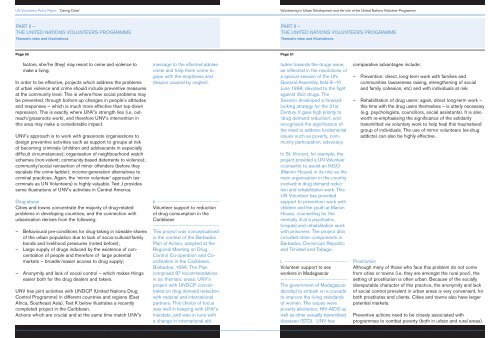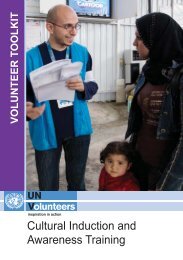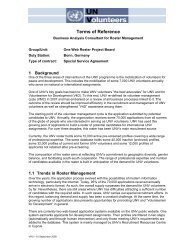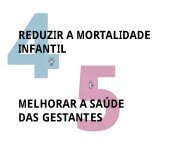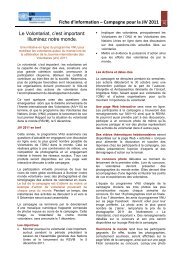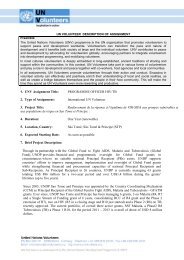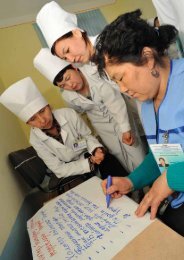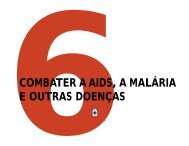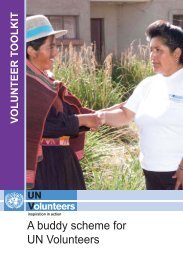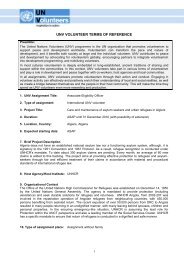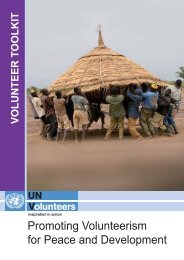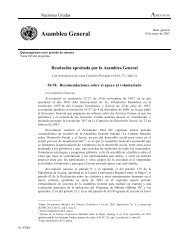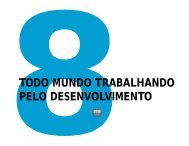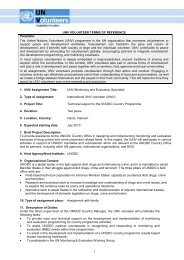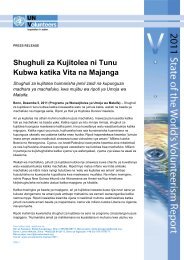View associated PDF document - United Nations Volunteers
View associated PDF document - United Nations Volunteers
View associated PDF document - United Nations Volunteers
You also want an ePaper? Increase the reach of your titles
YUMPU automatically turns print PDFs into web optimized ePapers that Google loves.
UN <strong>Volunteers</strong> Policy Paper<br />
‘Caring Cities’<br />
Volunteering in Urban Development and the role of the <strong>United</strong> <strong>Nations</strong> Volunteer Programme<br />
PART II –<br />
THE UNITED NATIONS VOLUNTEERS PROGRAMME<br />
Thematic view and illustrations<br />
PART II –<br />
THE UNITED NATIONS VOLUNTEERS PROGRAMME<br />
Thematic view and illustrations<br />
Page 50<br />
Page 51<br />
factors, she/he (they) may resort to crime and violence to<br />
make a living.<br />
In order to be effective, projects which address the problems<br />
of urban violence and crime should include preventive measures<br />
at the community level. This is where/how social problems may<br />
be prevented, through bottom-up changes in people’s attitudes<br />
and responses – which is much more effective than top-down<br />
repression. This is exactly where UNV’s strength lies (i.e. outreach/grassroots<br />
work), and therefore UNV’s intervention in<br />
this area may make a considerable impact.<br />
UNV’s approach is to work with grassroots organisations to<br />
design preventive activities such as support to groups at risk<br />
of becoming criminals (children and adolescents in especially<br />
difficult circumstances); organisation of neighbourhood watch<br />
schemes (non-violent; community-based deterrents to violence);<br />
community/social reinsertion of minor offenders (before they<br />
escalate the crime-ladder); income-generation alternatives to<br />
criminal practices. Again, the ‘mirror volunteer’ approach (excriminals<br />
as UN <strong>Volunteers</strong>) is highly valuable. Text J provides<br />
some illustrations of UNV’s activities in Central America.<br />
Drug-abuse<br />
Cities and towns concentrate the majority of drug-related<br />
problems in developing countries, and the connection with<br />
urbanisation derives from the following:<br />
– Behavioural pre-conditions for drug-taking in sizeable shares<br />
of the urban population due to lack of socio-cultural/family<br />
bonds and livelihood pressures (noted before);<br />
– Large supply of drugs induced by the existence of concentration<br />
of people and therefore of large potential<br />
markets – broader/easier access to drug supply;<br />
– Anonymity and lack of social control – which makes things<br />
easier both for the drug dealers and takers.<br />
UNV has joint activities with UNDCP (<strong>United</strong> <strong>Nations</strong> Drug<br />
Control Programme) in different countries and regions (East<br />
Africa, Southeast Asia). Text K below illustrates a recently<br />
completed project in the Caribbean.<br />
Actions which are crucial and at the same time match UNV’s<br />
message to the affected adolescents<br />
and help them come to<br />
grips with the emptiness and<br />
despair caused by neglect.<br />
K --------------------------------------------<br />
Volunteer support to reduction<br />
of drug consumption in the<br />
Caribbean<br />
-----------------------------------------------<br />
This project was conceptualised<br />
in the context of the Barbados<br />
Plan of Action, adopted at the<br />
Regional Meeting on Drug<br />
Control Co-operation and Coordination<br />
in the Caribbean,<br />
Barbados, 1996. The Plan<br />
comprised 87 recommendations<br />
in six thematic areas. UNV’s<br />
project with UNDCP concentrated<br />
on drug demand reduction<br />
with national and international<br />
partners. This choice of focus<br />
was well in keeping with UNV’s<br />
mandate, and was in tune with<br />
a change in international atti-<br />
tudes towards the drugs issue,<br />
as reflected in the resolutions of<br />
a special session of the UN<br />
General Assembly held 8–10<br />
June 1998, devoted to the fight<br />
against illicit drugs. The<br />
Session developed a forwardlooking<br />
strategy for the 21st<br />
Century. It gave high priority to<br />
‘drug demand reduction’, and<br />
recognised the significance of<br />
the need to address fundamental<br />
issues such as poverty, community<br />
participation, advocacy.<br />
In St. Vincent, for example, the<br />
project provided a UN Volunteer<br />
counsellor to assist an NGO<br />
(Marion House) in its role as the<br />
main organisation in the country<br />
involved in drug demand reduction<br />
and rehabilitation work. This<br />
UN Volunteer has provided<br />
support to prevention work with<br />
children and the youth at Marion<br />
House, counselling for the<br />
mentally ill at a psychiatric<br />
hospital and rehabilitation work<br />
with prisoners. The project also<br />
included other components in<br />
Barbados, Dominican Republic<br />
and Trinidad and Tobago.<br />
L --------------------------------------------<br />
Volunteer support to sex<br />
workers in Madagascar<br />
-----------------------------------------------<br />
The government of Madagascar<br />
decided to embark on a crusade<br />
to improve the living standards<br />
of women. The issues were<br />
poverty alleviation, HIV-AIDS as<br />
well as other sexually transmitted<br />
diseases (STD). UNV has<br />
comparative advantages include:<br />
– Prevention: direct, long-term work with families and<br />
communities (awareness raising, strengthening of social<br />
and family cohesion, etc) and with individuals at risk.<br />
– Rehabilitation of drug users: again, direct long-term work –<br />
this time with the drug users themselves – is utterly necessary<br />
(e.g. psychologists, councillors, social assistants). It is also<br />
worth re-emphasising the significance of the solidarity<br />
transmitted via voluntary work to help heal this traumatised<br />
group of individuals. The use of mirror volunteers (ex-drug<br />
addicts) can also be highly effective.<br />
Prostitution<br />
Although many of those who face this problem do not come<br />
from cities or towns (i.e. they are amongst the rural poor), the<br />
setting of prostitution is often urban. Because of the socially<br />
disreputable character of this practice, the anonymity and lack<br />
of social control prevalent in urban areas is very convenient, for<br />
both prostitutes and clients. Cities and towns also have larger<br />
potential markets.<br />
Preventive actions need to be closely <strong>associated</strong> with<br />
programmes to combat poverty (both in urban and rural areas).


